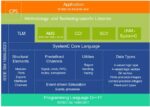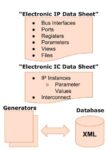At DVCon U.S. 2026, Accellera Systems Initiative reinforces its central role in shaping the future of electronic design and verification through a focused program of workshops, tutorials, and community engagement. As system complexity continues to rise across AI, automotive, HPC, and communications markets, the need for… Read More
Tag: accellera
SystemC Update 2024
SystemC version 1.0 came out in 2000 as a C++ class library for system-level modeling and simulation, and on SemiWiki.com there are some 497 references to the language. I wanted to provide an update in this blog so that engineering teams can become more efficient in using SystemC on their SoC projects, saving time and improving product… Read More
Simulating the Whole Car with Multi-Domain Simulation
Next significant automotive blog in a string I will be posting (see here for the previous blog).
In the semiconductor world, mixed simulation means mixing logic sim, circuit sim, virtual sim (for software running on the hardware we are designing) along with emulation and FPGA prototyping. While that span may seem all-encompassing,… Read More
An Update on IP-XACT standard 2022
Semiconductor IP design re-use has enabled the relentless growth in complexity of SoC and chiplet-based systems over the years, and with IP reuse comes many unique challenges. Fabless design companies use IP provided by a vibrant ecosystem of IP suppliers and foundries, plus internal re-use in the quest to get to market more … Read More
The Inconvenient Truth of Clock Domain Crossings
Almost everything that we do in chip design and verification was invented to raise the abstraction above schematics and polygons. Register-transfer-level (RTL) design, functional simulation, logic synthesis, floorplanning, and more fall into this category. Even the notion of binary circuits is an abstraction. Underneath… Read More
Visit with Agnisys at DAC 2023 in San Francisco July 10-12
I’d like to extend an invitation to you and your development team to visit with Agnisys in our booth, #2512, at this week’s Design Automation Conference (DAC) 2023, Monday, July 10-12.
In its 60th year, DAC is recognized as the premier event for the design and design automation of electronic chips to systems, so you can count on team… Read More
Podcast EP137: The International Impact of Accellera’s Work
Dan is joined by Lu Dai who is currently a Senior Director of Technical Standards at Qualcomm. Previously he was Senior Director of Engineering, leading Qualcomm’s SoC design verification team and front-end methodologies and initiatives. Lu is Chair of Accellera Systems Initiative and serves on the Board of Directors at RISC-V… Read More
Podcast EP96: The History, Reach and Impact of Accellera with Lynn Garibaldi
Dan is joined by Lynn Garibaldi, Executive Director, Accellera Systems Initiative. Lynn is the recipient of the Accellera 2022 Leadership Award. Dan and Lynn explore the history of Accellera, its beginnings and growth to a multi-standard organization and the impact of DVCon events around the world.
The views, thoughts, and … Read More
Co-Developing IP and SoC Bring Up Firmware with PSS
With ever challenging time to market requirements, co-developing IP and firmware is imperative for all system development projects. But that doesn’t make the task any easier. Depending on the complexity of the system being developed, the task gets tougher. For example, different pieces of IP may be the output of various teams… Read More
Breker Verification Systems Unleashes the SystemUVM Initiative to Empower UVM Engineering
The much anticipated (virtual) DVCON 2022 is happening this week and functional verification plus UVM is a very hot topic. Functional Verification Engineers using UVM can enjoy a large number of benefits by synthesizing test content for their testbenches. Abstract, easily composable models, coverage-driven content, deep… Read More









